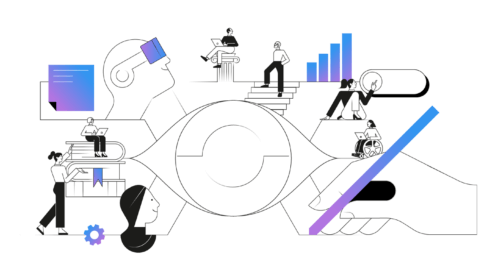Streamline library processes with Library Open Workflows (LibOW)
Library operations are increasingly shaped by the need to streamline processes, reduce manual interventions and foster collaboration across technical and non-technical staff. At the same time, innovation often changes how library professionals manage their tasks and Library Open Workflows (LibOW) from Ex Libris, part of Clarivate, opens up new possibilities for integrating these innovations.
LibOW represents a significant development in library automation, offering a platform that prioritizes flexible, user-driven workflow creation within a no-code environment. Recently, librarians who are development partners for LibOW gathered to share their experiences in a webinar that’s now available on-demand. Reduce complexity and drive efficiency with Library Open Workflows highlights institutional experiences, practical examples and emerging themes in library process optimization.
“Library Open Workflows empowers all library staff— regardless whether they are acquisition team members, catalogers, fulfillment operators, or systems librarians —
to build powerful automations and solve problems faster than ever before.”
Dr Mathias Kratzer, CIO and CISO, Bavarian State Library
What is LibOW and why does your library need it?
LibOW is designed to address persistent challenges in library operations, especially those involving repetitive or high-volume tasks that traditionally require either manual input or custom programming. At the core of LibOW is a visual, intuitive no-code interface that enables library staff to develop and execute automated workflows, ranging from metadata updates to user record administration. By abstracting technical complexity, LibOW seeks to make process automation more accessible and sustainable within diverse institutional contexts.
Notable advantages reported by development partners include:
- Reduced workload complexity – Focus on services instead of managing repetitive details.
- Improved collaboration – Reduce reliance on IT with tools that can be shared across departments.
- Enhanced efficiency – Opportunity for non-technical staff to participate more fully in technical solutions.
A hands-on approach with live demos
One of the webinar’s greatest strengths is its practical focus. The University of Kentucky and the Bavarian State Library demonstrated workflows designed and implemented at their libraries and provided practical insight into how LibOW functions within real-world library environments.
The demonstrations underscored the potential of LibOW to address both routine and institution-specific challenges, while prompting reflection on workflow design and sustainability.
“We created a workflow that updates item data instantly, reducing manual clicks and streamlining repetitive processes—staff productivity has improved and everyone loves it.”
Peter Heller, System Librarian, Bavarian State Library
Enabling broader participation in workflow design
A recurring theme within the webinar is the increasing accessibility of automation tools for staff who may lack traditional programming backgrounds. By lowering technical barriers, LibOW supports a participatory approach to workflow development, drawing on the expertise and contextual knowledge of library staff from multiple domains.
Historically, automating advanced processes in library systems required specialized programming knowledge. LibOW lowers that barrier, making complex tasks more manageable for non-technical library staff. With LibOW’s drag-and-drop interface, even those without coding experience can create workflows, run automation and solve local challenges.
This ease of use makes it possible for libraries to harness the full power of their systems, reducing burdens on IT teams. Additionally, by enabling cross-departmental participation, LibOW encourages collaboration and teamwork on technical initiatives.
Collaboration across the library community
Another exciting aspect of using LibOW is its vibrant sharing culture that maintains institutional privacy and security. The platform allows users to publish and share their workflows, which have been stripped of personal information and API keys, with the broader library community, fostering innovation and collaboration across institutions. During the webinar, the presenters emphasized how the LibOW community can help libraries stay on top of emerging needs, with enhancements and new features frequently being introduced based on direct user feedback. These collaborative practices help sustain innovation and adaptation to changing institutional requirements.
Worth a bookmark: watch now or later
The on-demand webinar, Reduce Complexity and Drive Efficiency with Library Open Workflows, offers library professionals an opportunity to critically assess the potential of no-code workflow automation. Through institutional examples and reflective discussion, the webinar raises important considerations regarding the roles of staff, the design of technical systems and the future path of library innovation. Feel free to bookmark the link and watch it whenever it suits you. For more details, visit the Library Open Workflows page to explore comprehensive resources and join a growing community of empowered professionals today!










